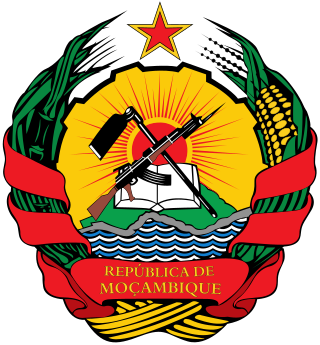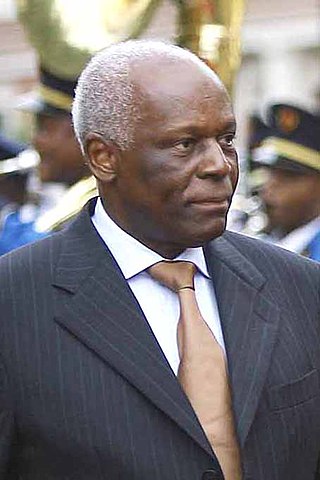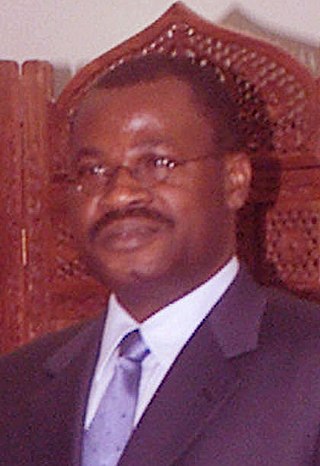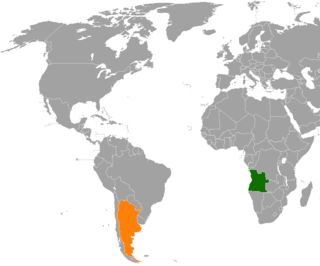| |||||
| Centuries: | |||||
|---|---|---|---|---|---|
| Decades: | |||||
| See also: | List of years in Angola | ||||
Events from the year 2004 in Angola
| |||||
| Centuries: | |||||
|---|---|---|---|---|---|
| Decades: | |||||
| See also: | List of years in Angola | ||||
Events from the year 2004 in Angola

The current political regime in Angola is presidentialism, in which the President of the Republic is also head of state and government; it is advised by a Council of Ministers, which together with the President form the national executive power. Legislative power rests with the 220 parliamentarians elected to the National Assembly. The President of the Republic, together with the parliament, appoints the majority of the members of the two highest bodies of the judiciary, that is, the Constitutional Court and the Supreme Court. The judiciary is still made up of the Court of Auditors and the Supreme Military Court.

The foreign relations of Angola are based on Angola's strong support of U.S. foreign policy as the Angolan economy is dependent on U.S. foreign aid. From 1975 to 1989, Angola was aligned with the Eastern bloc, in particular the Soviet Union, Libya, and Cuba. Since then, it has focused on improving relationships with Western countries, cultivating links with other Portuguese-speaking countries, and asserting its own national interests in Central Africa through military and diplomatic intervention. In 1993, it established formal diplomatic relations with the United States. It has entered the Southern African Development Community as a vehicle for improving ties with its largely Anglophone neighbors to the south. Zimbabwe and Namibia joined Angola in its military intervention in the Democratic Republic of the Congo, where Angolan troops remain in support of the Joseph Kabila government. It also has intervened in the Republic of the Congo (Brazzaville) in support of Denis Sassou-Nguesso in the civil war.

The foreign relations of Eritrea are the policies of the Eritrean government by which it administers its external relations with other nations. Since its independence, Eritrea's foreign relations have been dominated by conflict and confrontation, both in the regional and international arenas. It has maintained often troubled, and usually violent, relations with its neighbors, including brief armed conflicts with Yemen and Djibouti and a destructive war with its bigger-neighbour, Ethiopia. At present, Eritrea has very tense relations with neighboring Ethiopia and Djibouti. Relations in the international arena also have been strained since the last decade, particularly with major powers. What appeared cordial relations with the US in the 1990s turned acrimonious following the border war with Ethiopia, 1998-2000. Although the two nations have a close working relationship regarding the ongoing war on terror, there has been a growing tension in other areas. Ties with international organizations such as the United Nations, the African Union, and the European Union have also been complicated in part because of Eritrea's outrage at their reluctance to force Ethiopia to accept a boundary commission ruling issued in 2002.

Malawi's former President Bakili Muluzi continued the pro-Western foreign policy established by his predecessor, Hastings Banda. It maintains excellent diplomatic relations with principal Western countries. Malawi's close relations with South Africa throughout the apartheid era strained its relations with other African nations. Following the collapse of apartheid in 1994, Malawi developed, and currently maintains, strong diplomatic relations with all African countries.

While alliances dating back to the Mozambican War of Independence remain relevant, Mozambique's foreign policy has become increasingly pragmatic. The twin pillars of the policy are maintenance of good relations with its neighbors and maintenance and expansion of ties to development partners.

When Sultan Qaboos bin Said Al Said assumed power in 1970, Oman had limited contacts with the outside world, including neighbouring Arab states. A special treaty relationship permitted the United Kingdom close involvement in Oman's civil and military affairs. Ties with the United Kingdom remained very close throughout Sultan Qaboos' reign, along with strong ties to the United States.

Foreign relations of Saudi Arabia are the diplomatic and trade relations between Saudi Arabia and other countries around the world. The foreign policy of Saudi Arabia is focused on co-operation with the oil-exporting Gulf States, the unity of the Arab world, Islamic solidarity, and support for the United Nations. In practice, the main concerns in recent years have been relations with the US, the Saudi Arabian–led intervention in Yemen, the Israeli–Palestinian conflict, Iraq, the perceived threat from the Islamic Republic of Iran, and the effect of oil pricing. Saudi Arabia contributes large amounts of development aid to Muslim countries. From 1986 to 2006, the country donated £49 billion in aid.

After independence in 1964 the foreign relations of Zambia were mostly focused on supporting liberation movements in other countries in Southern Africa, such as the African National Congress and SWAPO. During the Cold War Zambia was a member of the Non-Aligned Movement.

José Eduardo dos Santos was the president of Angola from 1979 to 2017. As president, dos Santos was also the commander-in-chief of the Angolan Armed Forces (FAA) and president of the People's Movement for the Liberation of Angola (MPLA), the party that has ruled Angola since it won independence in 1975. He was the second-longest-serving president in Africa, surpassed only by Teodoro Obiang Nguema Mbasogo of Equatorial Guinea.

João Bernardo de Miranda is an Angolan politician who is currently the Ambassador of Angola in France. He was Minister of External Relations of Angola from January 1999 to October 2008 and the Governor of Bengo Province from 2009 to 2018.
Manuel Pedro Pacavira was the ambassador of Angola to Italy, the United Nations Food and Agriculture Organization (FAO), the International Fund for Agriculture and Development (IFAD) and the World Food Program. He previously served as Transportation Minister. He succeeded Elísio de Figueiredo as ambassador to the United Nations in 1988, serving until 1991.

Angola and Israel established diplomatic relations in 1993. In 1995, Israel opened an embassy in Luanda and in 2000, Angola opened an embassy in Tel Aviv.

Angola–Portugal relations refers to bilateral relations between Angola and Portugal. Relations between the two are intrinsically tied because of the Portuguese Empire with Angola under Portuguese rule from 1575–1975.

Russia has an embassy in Luanda. Angola has an embassy in Moscow and an honorary consulate in Saint Petersburg. Angola and the precursor to Russia, the Soviet Union, established relations upon Angola's independence.
Events from the year 2007 in Angola

Angola and Argentina are members of the Group of 77 and the United Nations.

The 1955 Austrian State Treaty ended the four-power occupation and recognized Austria as an independent and sovereign state. In October 1955, the Federal Assembly passed a constitutional law in which "Austria declares of her own free will her perpetual neutrality." The second section of this law stated that "in all future times Austria will not join any military alliances and will not permit the establishment of any foreign military bases on her territory." Since then, Austria has shaped its foreign policy on the basis of neutrality.

Angola–Mexico relations are the diplomatic relations between the Republic of Angola and the United Mexican States. Both nations are members of the United Nations. Neither country has a resident ambassador.